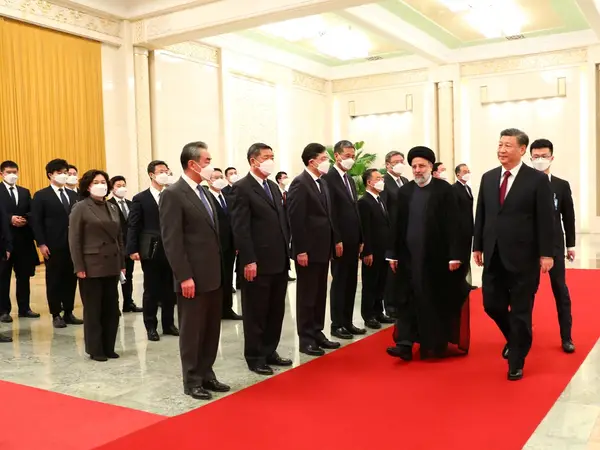Islamic Republic's hardliner officials and media say President Ebrahim Raisi’s state visit this week to China “defeated the project to isolate Iran”.
“The Iranian president’s visit to Beijing was made at a time when western powers, with the help of some misled elements, were trying to isolate Iran in the international community. This visit ruined the enemies’ plans and defeated the project of isolating Iran,” Moslem Salehi, a member of the parliament’s economic committee told the official news agency (IRNA) Saturday.
Moslemi also said Iran can “challenge the unilateralism of the United States” as an influential country alongside Russia and China and argued that Beijing’s cooperation with Tehran at this juncture is proof of Iran's “political stability”.
As Iran's protest movement enters its sixth month, European powers are increasingly sending strong signals that they no longer consider diplomacy a viable route in their dealings with the Islamic Republic, without fundamental changes in Tehran’s policies.
In the latest development, the Islamic Republic not only lost an invitation to the Munich Security Conference, but also had to witness the presence of the Iranian opposition figures, most notably the exiled crown prince, Reza Pahlavi, who was a speaker at the conference. In an unattributed commentary Saturday, the official news agency (IRNA) slammed the exclusion of Iran, and its strategic ally Russia, from the conference.
Pro-government officials claim that tighter relations with China and Russia will balance out the pressure from the US and European powers. “To counter these pressures we need breathing space to be able to manage the country’s affairs,” conservative former lawmaker Seyed Reza Akrami told Khabar Online.
He argued that China’s invitation to the Iranian president was “extremely important” given that Iran has not agreed to the restoration of the 2015 nuclear deal, Joint Comprehensive Plan of Action (JCPOA) or acceded to the conventions of the Financial Action Task Force (FATF) which Raisi and other hardliners have strongly opposed.
Iran has been on the FATF blacklist, along with North Korea, since February 2018 for failing to pass legislation introducing transparency measures designed to combat money-laundering, corruption, and financing of ‘terrorism.’
Many analysts, politicians and former government officials in Iran say that failure to join the FATF is detrimental to economic relations with the world, including Russia and China, as foreign banks would still be wary over transactions with Iran.
According to the head of Iran’s Trade Promotion Organization (TPO) Alireza Peyman-Pak, during Raisi’s China visit the two countries signed “19 documents, contracts, and agreements in the fields of industry, mining, and trade, apart from another 20 major documents” to the tune of 3.5 billion dollars.
However, in a series of tweets on Friday, Hamid Aboutalebi, the political deputy of former President Hassan Rouhani’s office argued that Raisi’s] visit to Beijing would not result in a such a ‘strategic balance’.
In the joint statement of the two presidents, Aboutalebi pointed out, there is no mention of the 25-year Comprehensive Cooperation Agreement signed in 2021. There is also no word about Chinese nuclear cooperation with Iran, the modernization of the Arak heavy water reactor which in 2016 during Jinping’s visit to Tehran, they agreed to advance. Banking and financial cooperation was also not mentioned.
Aboutalebi claimed that China has only agreed to mention the lifting of US sanctions in the joint statement only within the context of reviving the 2015 nuclear deal.
Warning not to pin too much hope on China, he wrote, “So, let’s be aware that [Raisi’s] visit to Beijing will not result in a ‘strategic balance in Iran's foreign relation’.”
